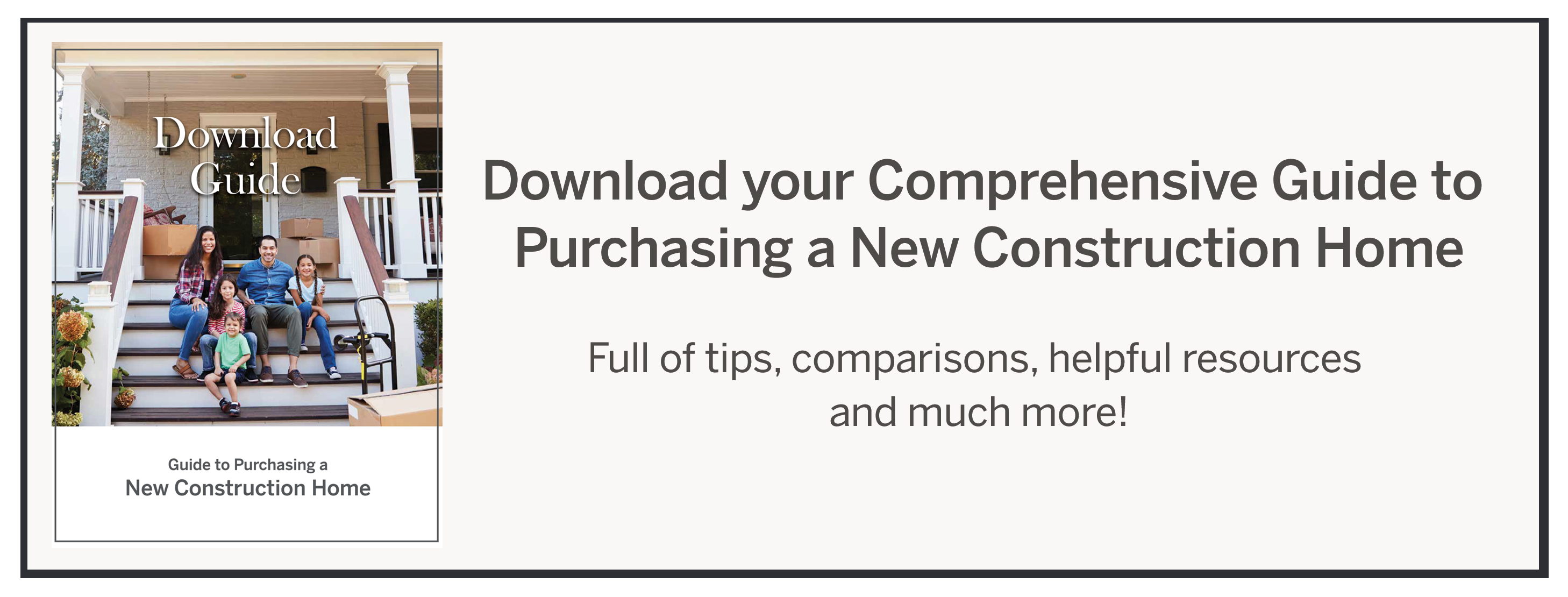Buying your first home is one of the biggest, milestone moments of your life. As you look forward to your future and prepare to make your decision, you will likely have many questions come up along the way. While there are many steps to the home buying process, some of the biggest questions will surround home financing.
Is a new construction home right for you?
Click here for 8 reasons why it might be
When you’re first getting started, you’ll run into new terminology along the way that you’ll need to familiarize yourself with. We’ve gathered a list of key terms to help you through the process when it comes to financing your first home.
Home Financing Key Terms
Mortgage
A mortgage is a type of loan you can use to buy or refinance a home. Mortgages are secured loans in which the borrower promises collateral to the lender in the event they stop making payments. In the case of buying a home, the collateral is the home itself. This allows the purchaser to buy the home without paying the full amount upfront.
Term
A term is the number of years it will take to pay off a loan.
When buying a home with a mortgage, you’ll make monthly payments until you pay off the balance on your loan. The most common term for a mortgage is 30 years, with 20, 15, and 10 also typically available as options. A shorter term means there will be a higher monthly payment, but lower overall interest costs.
Fixed-rate & Adjustable-rate
When choosing a mortgage program, you’ll choose between fixed-rates and adjustable-rates. A fixed-rate means the interest rate and your principal payment are the same as long as you have the loan. Alternately, an adjustable-rate means the interest rate can change at intervals determined in your mortgage contract, which can make your monthly payment increase or decrease. For example, does your interest payment stay the same for 30 years in a row, or does it stay at a fixed rate for 7 years and then increase or decrease?
Components of a Mortgage Payment:
Principal, Interest, Real Estate Tax, Homeowner's Insurance
There are typically four main components of a mortgage that make up the total monthly payment.
- Principal – Each monthly payment includes a portion towards the principal balance. The principal balance is the amount that is left to pay back. So, your original loan amount minus payments you’ve made against that balance.
- Interest – A portion of every payment also includes interest due on the loan. The interest will be what the bank is collecting at a predetermined rate in exchange for giving you the money.
- Real Estate Tax – Your lender will typically collect property taxes alongside your mortgage payment and pay it on your behalf when it’s due.
- Homeowner’s Insurance – Homeowner’s insurance is typically required by mortgage lenders, covering damages from accidents, storms, fires, etc. They may collect the premiums alongside your mortgage payment and then pay the insurance bill out of your escrow account when it’s due. An escrow account essentially works as a checking account, where your lender will house funds for taxes and insurance and pay the monthly fees for you.
Closing Documents
- Appraisal - An appraisal is an unbiased professional opinion of the value of a home and is used whenever a mortgage is involved in the buying, refinancing, or selling of that property. A qualified appraiser creates a report based on a visual inspection, using recent sales of similar properties, current market trends, and aspects of the home (e.g., amenities, floor plan, square footage) to determine the property’s appraisal value. The borrower usually pays the appraisal fee, which can be several hundred dollars.
- Closing Disclosure (or CD) - A CD is a five-page form that provides final details about the mortgage loan you have selected. It includes the loan terms, your projected monthly payments, and how much you will pay in fees and other costs to get your mortgage (closing costs).
- Title Insurance - Title insurance is a form of indemnity insurance that protects lenders and homebuyers from financial loss sustained from defects in a title to a property. The most common type of title insurance is lender's title insurance, which the borrower purchases to protect the lender. The other type is owner's title insurance, which is often paid for by the seller to protect the buyer's equity in the property
- Deed - A property deed is a written and signed legal instrument that is used to transfer ownership of real property from the old owner (the grantor) to the new owner (the grantee).
Different Types of Home Ownership & Additional Costs
There are three different types of ownership. In addition to your mortgage payments, there are often additional costs that can contribute to total monthly housing expenses, such as HOA or condo fees. Here are the three types of ownership and typical associated fees:
- Fee simple ownership – Typically for a townhome or single-family home, it means that you own the home and land it is built on. Often townhomes, and sometimes single-family homes, are part of a homeowner’s association, which will require you to pay monthly HOA fees. These fees often go to maintaining common spaces, trash pick-up, snow removal, etc.
- Condominium ownership – In a condominium, the owner has individual title to the space inside the unit. This could be a one-level flat or multiple stories, but you only own what’s on the inside, while a master condominium association owns everything exterior. Owners of a condominium are typically required to pay condo fees, which oftentimes are more than HOA fees. In addition to the exterior maintenance, these fees will also go towards expenses such as building maintenance.
- Co-Op ownership – This type of ownership is typically found in large cities like New York City, where a housing unit is owned and controlled jointly by a group of individuals who have equal shares, membership, and occupancy rights to the housing community. This type of ownership is less common in the DC Metro area. Co-op owners pay a monthly co-op fee called a maintenance fee, which goes towards the co-ops underlying mortgage payments.
Guide to Purchasing a New Construction Home
Steps, tips, & more for the first-time home buyer
Additional monthly payment costs to budget for can include:
- HOA fees - An HOA (Home Owner Association) is a legal entity that manages a shared housing complex, which collects monthly dues from its members to fund its activities from landscaping to trash pickup and everything in between. They vary from community to community, but these monthly costs will factor into your overall monthly payments.
- Annual fees (also known as Deferred Water & Sewer Fees) - Some communities will have annual fees due to private water and sewer facilities. These are not related to the actual usage of water and sewage services, but are fees to cover all or a portion of the costs of installing the water and sewer components and systems for the community.
- Maintenance & Utilities - While home maintenance and utility costs will vary from year to year or month to month, it’s important to budget for these costs upfront. With maintenance, this will depend on the type of home you purchase. A new construction home will have minimal to no maintenance expenses upon purchasing, whereas a resale may have costs to consider including renovations, landscaping, etc.
Utility costs will also range depending on usage and location. Gas, electric, water & sewage, internet, phone, & cable, trash & recycling will all factor into your monthly costs.
Direct Mortgage Lender vs. Mortgage Broker
- Direct Mortgage Lender - A direct lender is a bank or other financial institution that can provide mortgages directly to borrowers without intermediaries, such as investment banks or private equity firms. They will work with you throughout the process through closing and ensure your loan is processed accurately. With a lender, you will also have the advantage of the financial backing of a large bank or institution.
- Mortgage Broker - A broker acts as a middle man to pair borrowers and mortgage lenders together, but do not actually fund or originate mortgages. They gather the borrower’s financial information and determine the right loan amount, then submit the loan to a lender for approval.
Pre-approval
- Know what you can afford – As you interview a mortgage lender, the conversation will likely include an informal evaluation of your finances including your credit scores, debt, income, and assets. The process varies by lender, but based on your overall financial state, the lender will estimate how much you may be able to borrow. This can help give you a sense of your financial readiness and introduce you to various mortgage options.
This is a good first step to give you a sense of your financial readiness even if you aren’t sure if you are ready to dive into the home buying process yet. If you are ready to move forward, many first time buyers skip this step and go straight to the mortgage pre-approval process. - Pre-approval – A mortgage pre-approval requires you to provide proof of your financial history and stability. The lender will verify each of the items, including verifying your income, employment, and credit report, and provide you with a preapproval letter which states the amount and type of mortgage the lender is willing to offer.
The purpose of getting pre-approval is to show that you’re a serious buyer, especially in a competitive market.
New Construction Townhomes in Washington, DC
Priced from the $500s
Other Common Terms You May Come Across
- Conforming Loan - A mortgage that is equal to or less than the dollar amount established by the limit set by the Federal Housing Finance Agency, while also meeting the funding criteria of Freddie Mac and Fannie Mae.
- Non-conforming Loan - Loans that cannot be purchased by Fannie Mae or Freddie Mac, these types of loans include jumbo loans that exceed the conforming loan limits and have different underwriting guidelines. They allow individuals to borrow larger amounts than would be possible with a conforming loan.
- Jumbo Loan - Also known as a jumbo mortgage, a jumbo loan is a loan that exceeds the dollar amount loan-servicing limits put in place by government-sponsored enterprises, Freddie Mac and Fannie Mae. This would make them non-conforming loans.
- Conventional Loan - A mortgage loan that’s not backed by a government agency, conventional loans are originated and serviced by private mortgage lenders like banks, credit unions, and other financial institutions.
- Federal Housing Administration (FHA) Loan - An FHA loan is a government-backed loan insured by the Federal Housing Administration. FHA home loans require lower downpayments and lower credit score requirements with more flexible underwriting rules. They often have higher monthly mortgage insurance requirements when compared to similar conventional loan programs.
- Private Mortgage Insurance (PMI) - PMI is arranged by the lender and provided by private insurance companies. PMI is usually required when you have a conventional loan and make a down payment of less than 20 percent of the home’s purchase price. If you are refinancing with a conventional loan and your equity is less than 20 percent of the value of your home, PMI is also usually required.
- Military Home Loan - For active US military personnel and Veterans, military home loans (also known as VA home loans, VA mortgages, or military mortgages) are issued by private lending companies and guaranteed by the Veterans Administration.
Now that you feel comfortable with the terminology, you can move forward in the home buying process equipped with the background knowledge you’ll need throughout the journey of purchasing your first home.
Whether you’re moving out of your 2-bedroom apartment in the city, relocating for a new job, getting ready to start a family, or are feeling ready for the next step, buying your first home is a memorable and exciting experience. For more home buying tips, check out our New Construction Guide. This comprehensive guide compares the benefits of purchasing a new home vs. resale, offers insight into the complete home buying process, provides tips for selecting new home options, and much more.
Topics:




